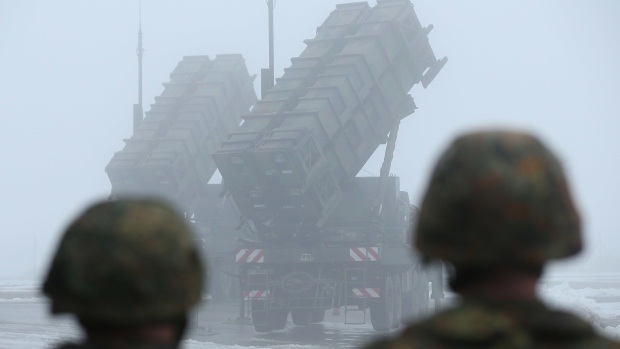Jan 19, 2023
Buy More Ammo: What NATO Is Learning in Helping Ukraine to Fight
, Bloomberg News

(Bloomberg) -- NATO allies are likely to invest in air defense capabilities and deeper stocks of ammunition in the coming years in response to lessons it learned from Russia’s war in Ukraine, the alliance’s military chief said.
Russia’s invasion shows the North Atlantic Treaty Organization needs to be prepared to fight World War One-style trench warfare and artillery barrages, while at the same time countering attacks and surveillance from armed drones, the chairman of the alliance’s military committee, Admiral Rob Bauer, said in an interview with Bloomberg News.
“We have to prepare for the future, but we also have still to be able to fight the war of the past,” Bauer said, pointing to the decisive role of land forces, as well as missile and air power attacks, in Ukraine.
Russian missiles have been particularly damaging, destroying civilian and critical infrastructure and killing dozens, including in an attack in Dnipro last weekend. At the same time, Ukraine, with help from Europe and the US, has become increasingly proficient at intercepting Russian missiles and drones.
That means air defense systems, which can counter ballistic and cruise missiles, fighter jets and drones, will be one area where “a lot of nations” will invest more in the coming decade, Bauer said.
All NATO members won’t necessarily need to invest in Patriot-type air and missile defense systems since some allies already specialize in those, he added, but nations will likely buy more medium-range systems.
Deep-strike capabilities, which can take out the enemy installations that are launching missiles, will also be critical, he said, noting these would likely be systems that would allow allies to fire missiles either from the air to a ground target or from the ground to another ground target.
The chairman led a two-day meeting in Brussels with NATO military chiefs starting Wednesday, where nations discussed the war in Ukraine and the alliance’s defense planning.
Read More: Ukraine Struggles to Restore Utilities After Big Russian Strikes
Bauer rebuffed any notion that the alliance faces less urgency in beefing up its capabilities because of Russia’s failures on the battlefield. He noted that the alliance’s military strategy still centers around Russia’s capabilities before the invasion in February last year. As NATO pushes ahead with implementation of those plans, the alliance is adjusting to how it sees the Russian threat developing.
“We are convinced the Russians will reconstitute their armed forces — it will take time, it will take money, they will learn from their own mistakes,” he said. “We should not underestimate the Russians.”
Drones are also gaining importance, the military chief said, as the alliance increasingly weighs the benefits of mass quantities of cheaper products that can be more easily replaced versus highly precise, but costlier weapons. While an F-35 fighter jet, for example, is less vulnerable and can perform many functions, like vacuuming up tons of data, it is also expensive and difficult to quickly replace if it gets shot down.
”Quantity can be a quality as well,” Bauer said. “If you have a simpler piece of equipment, which you can replace more easily, then sometimes that is also an advantage.”
Read More: Conflict in Ukraine Moves to ‘War of Drones’ as Winter Looms
The vast amount of ammunition that both sides are burning through is also creating an urgent need for allies to ramp up production — both to donate to Ukraine but also to replenish nations’ own stocks. On average, Russia is using 20,000 rounds a day, about the amount the US produces in a month, Bauer said.
While both Russia and Ukraine are seeing their ammunition stocks drop, the Ukrainian forces have been more efficient and more successful in hitting their targets than the other way around, the NATO military chief said, adding both sides will at some stage need to limit their use of ammunition.
Ukraine has warned that Russia may launch another offensive, including another attempt at taking Kyiv, but Bauer said it would “not be something the Russians can do tomorrow.” He pointed to problems on the Russian side in manpower, equipment, ammunition and leadership. Many officers died in recent attacks, he added, which will hamper Moscow’s ability to command a larger force.
Bauer also stressed the importance of Ukraine’s resilient society in its success in repelling Russia, praising civilians for sharing intelligence and supporting their government despite the loss of life and destruction of energy, heating and water infrastructure.
“The Ukrainians know what they’re fighting for — for their nation and who they are. Russians still don’t know what they’re fighting for,” Bauer said. “It’s important for us at NATO to learn that lesson as well.”
©2023 Bloomberg L.P.


